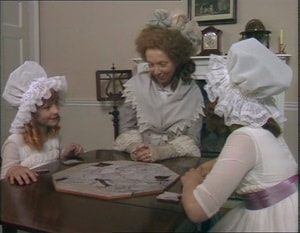| "There is a quickness of perception in some, a nicety in the discernment of character, a natural penetration, in short, which no experience in others can equal, and Lady Russell had been less gifted in this part of understanding than her young friend." -- Jane Austen narration in Persuasion |
 Sylvestra Le Touzel and Jonathan Stephens
Sylvestra Le Touzel and Jonathan Stephens In the previous post we looked at how Austen and other writers of her time used the terms "temper" and "disposition" to describe innate personality. For example:
- Fanny Price is taken aback when she meets her fractious sister Susan: "it was at least a fortnight before she began to understand a disposition so totally different from her own."
- Mrs. Grant has "a temper to love and be loved" and a "happiness of disposition."
- In Coraly (1819), Mrs. Stanley’s heart, “which was benevolence itself, had indeed been blasted in the bitter school of poverty and adversity; and ill usage had soured in some degree a temper naturally good and kind.”
- Austen compares the personalities and situations of the three Ward sisters. "[Fanny's mother's] disposition was naturally easy and indolent, like Lady Bertram’s; and a situation of similar affluence and do-nothingness would have been much more suited to her capacity than the exertions and self-denials of the one which her imprudent marriage had placed her in. She might have made just as good a woman of consequence as Lady Bertram, but Mrs. Norris would have been a more respectable mother of nine children on a small income."
Just like us, our predecessors observed that some people were born brighter than others. One’s inborn level of intelligence or capacity to learn was termed one’s “understanding.” They also recognized “cleverness” or “quick apprehension,” the ability to absorb new information quickly.
Henry Crawford flatters Fanny for her “indefatigable patience in trying to make it possible for [Mr. Rushworth] to learn his part [in the play Lover’s Vows]—in trying to give him a brain which nature had denied—to mix up an understanding for him out of the superfluity of your own!”
Many other authors commented on the "understanding" of their characters:
- In Fashionable Involvements, by Susannah Gunning Minifie, Lady Isleworth deceives a baronet. She “completely imposed on his shallow understanding, [and] established her own plans…”
- In Catherine Hutton’s Oakwood Hall, Mr. Millichap enjoys using his cleverness to make contrary arguments. He tries to get a rise out of Mr. Oakwood by arguing that women are naturally more intelligent than men: “We all know that women rule, and were born to rule, men; and as it cannot be by superior strength, it must be by superior understanding. Spirit goes beyond strength; or man could never have tamed and ridden a horse.”
- In Barbara Holland's Self-Denial, a baronet is entranced by the lovely Caroline: "Every observation he made confirmed him in the belief of her superior virtues and excellent understanding..."

The Bertram girls and Mrs. Norris confuse ignorance with stupidity. When Fanny first comes to Mansfield, most of the Bertrams, with the exception of Edmund, conclude that she is not very bright: “Fanny could read, [do needlework, and write, but she had been taught nothing more; and as her cousins found her ignorant of many things with which they had been long familiar, they thought her prodigiously stupid.”
This introduces an extended passage in which Maria and Julia talk about "all the metals, semi-metals, planets, and distinguished philosophers" they can recite.
Mrs. Norris tells Maria and Julia: “you are blessed with wonderful memories, and your poor cousin has probably none at all. There is a vast deal of difference in memories, as well as in everything else, and therefore you must make allowance for your cousin, and pity her deficiency. And remember that, if you are ever so forward and clever yourselves, you should always be modest; for, much as you know already, there is a great deal more for you to learn.”
Austen concludes the dialogue by pointing out: “Such were the counsels by which Mrs. Norris assisted to form her nieces’ minds; and it is not very wonderful [ie surprising] that... they should be entirely deficient in the less common acquirements of self-knowledge, generosity and humility."
This is an explicit signal to the reader that the girls' arrogance will play a role in the unfolding plot of the novel.

- As the young people approach Sotherton, Fanny says: “Now, where is the avenue? The house fronts the east, I perceive. The avenue, therefore, must be at the back of it. Mr. Rushworth talked of the west front.”
- At the parsonage, Fanny wants to leave when the rain stops. She tells Mary Crawford the clouds have “passed over... I have been watching them. This weather is all from the south.”
Fanny knows it’s hopeless to try to get Lady Bertram on her side as regards Crawford’s proposal of marriage because “If her aunt’s feelings were against her, nothing could be hoped from attacking her understanding.”
Sir Thomas decides to send Fanny to live with her parents in Portsmouth: “It was a medicinal project upon his niece’s understanding, which he must consider as at present diseased. A residence of eight or nine years in the abode of wealth and plenty had a little disordered her powers of comparing and judging.”
The powers of comparing and judging were also referred to as sense, apprehension, and discernment. More about those mental qualities next time.
Previous post: Disposition and Temper Next post: Apprehension and Discernment.
| In this series I'm focussing on the theme of education as it was discussed in novels. There were many, many 18th century treatises which speculated about and discussed the mechanics of intelligence, and learning, including famous and influential works of philosophy. As well, there were many books, essays and sermons which theorized about the correct way of educate children. That's a vast topic which is too big for me to wish to tackle. However, I'll just mention that people of the long 18th century had lots of reading material on these topics. The word “understanding” appears 74 times in Mansfield Park. It was used in the way we use it today, to mean “comprehend:” (“I thoroughly understand you,” cried Mrs. Norris). It also refers to a couple deciding to get married, or to people deciding someone should get married: (It was not long before a good understanding took place between [Mrs. Rushworth] and [Mrs. Norris]). Or it could even refer to people getting along well in general. All photographs in this post are from the 1983 British mini-series of Mansfield Park. |

 RSS Feed
RSS Feed